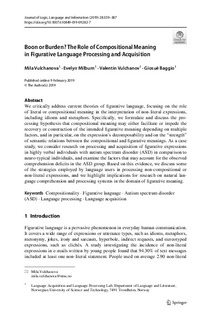Boon or burden? The role of compositional meaning in figurative language processing and acquisition
Journal article, Peer reviewed
Published version
Permanent lenke
http://hdl.handle.net/11250/2643799Utgivelsesdato
2019Metadata
Vis full innførselSamlinger
Originalversjon
Journal of Logic, Language and Information. 2019, 28 (2), 359-387. 10.1007/s10849-019-09282-7Sammendrag
We critically address current theories of figurative language, focusing on the role of literal or compositional meaning in the interpretation of non-literal expressions, including idioms and metaphors. Specifically, we formulate and discuss the processing hypothesis that compositional meaning may either facilitate or impede the recovery or construction of the intended figurative meaning depending on multiple factors, and in particular, on the expression’s decomposability and on the “strength” of semantic relations between the compositional and figurative meanings. As a case study, we consider research on processing and acquisition of figurative expressions in highly verbal individuals with autism spectrum disorder (ASD) in comparison to neuro-typical individuals, and examine the factors that may account for the observed comprehension deficits in the ASD group. Based on this evidence, we discuss some of the strategies employed by language users in processing non-compositional or non-literal expressions, and we highlight implications for research on natural language comprehension and processing systems in the domain of figurative meaning.

